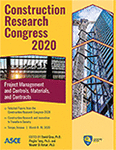Construction Research Congress 2020
Conceptual Model among Neighborhood Environment, Personal Competence, and Quality of Life of Older Adults Aging in Place: Based on “The Ecological Theory of Aging”
Publication: Construction Research Congress 2020: Project Management and Controls, Materials, and Contracts
ABSTRACT
For older adults who are aging in place, the neighborhood environment plays a pretty important role in their lives due to their functional impairment and low mobility. The ecological theory of aging pointed out that the relative relation between the personal competence and environmental press from their neighborhood environment would impact on older adults. This study aims to investigate how this relative relation impacts on the quality of life (QoL) of older adults. The hypothesis of the conceptual model of “P-E-Q” is established based on the ecological theory of aging. Variables and its measurable items are designed to assess the neighborhood environmental press, personal competence, and QoL of older adults. 192 eligible older adults aging in place are surveyed. Reliability test and linear regression analysis are adopted to verify measurable items and analyze qualitative data. Results of linear regression analysis shows difference value between personal competence and neighborhood environmental press can explain 42.3% of the variance of QoL of older adults. It reveals that the difference value between personal competence and neighborhood environmental press has a significant influence on QoL of older adults, supporting the hypothesis of the conceptual model of “P-E-Q”. The neighborhood environment should be improved to fit the competence of older adults who age in place. This study provides valuable strategies to optimize neighborhood environment for supporting aging in place.
Get full access to this article
View all available purchase options and get full access to this chapter.
REFERENCES
Arnold, R., Ranchor, A. V., Sanderman, R., Kempen, G. I. J. M., Ormel, J., & Suurmeijer, T. P. B. M. (2004). The Relative Contribution of Domains of Quality of Life to Overall Quality of Life for Different Chronic Diseases. Quality of Life Research, 13(5), 883-896.
Chaudhury, H., Mahmood, A., Michael, Y. L., Campo, M., & Hay, K. (2012). The influence of neighborhood residential density, physical and social environments on older adults' physical activity: An exploratory study in two metropolitan areas. Journal of Aging Studies, 26(1), 35-43.
Guyatt, G. H., Feeny, D. H., & Patrick, D. L. (1993). MEASURING HEALTH-RELATED QUALITY-OF-LIFE. Annals of Internal Medicine, 118(8), 622-629.
Lawton, M. P. (1971). The functional assessment of elderly people. Journal of the American Geriatrics Society, 19(6), 465-481.
Lawton, M. P. (1977). An Ecological Theory of Aging Applied to Elderly Housing. Journal of Architectural Education, 31(1), 8-10.
Loo, B. P., Lam, W. W., Mahendran, R., & Katagiri, K. (2017a). How Is the Neighborhood Environment Related to the Health of Seniors Living in Hong Kong, Singapore, and Tokyo? Some Insights for Promoting Aging in Place. Annals of the American Association of Geographers, 107(4), 812-828.
Loo, B. P. Y., Mahendran, R., Katagiri, K., & Lam, W. W. Y. (2017b). Walking, neighbourhood environment and quality of life among older people. Current Opinion in Environmental Sustainability, 25, 8-13.
United Nations. (2015). World Population Ageing 2015. New York: United Nations.
WHO. (1996). WHOQOL_BREF: Introduction, administration, scoring and generic version of the assessment (field trial version). Geneva: World Health Organization.
WHO. (2013). How to use the ICF: A practical manual for using the International Classification of Functioning, Disability and Health (ICF). Exposure draft for comment. Geneva: World Health Organization.
WHOQOL Group. (1995). The World Health Organization quality of life assessment (WHOQOL): Position paper from the World Health Organization. Social Science & Medicine, 41(10), 1403-1409.
Zhang, F., Li, D., Ahrentzen, S., & Feng, H. (2019). Exploring the inner relationship among neighborhood environmental factors affecting quality of life of older adults based on SLR–ISM method. Journal of Housing and the Built Environment. https://doi.org/10.1007/s10901-019-09674-y
Zhang, F., & Li, D. (2019). Exploring the influence of urban neighborhood environment on quality of life of older adults aging in place: a cross-sectional study. Journal of Environmental Health and Prevental Medicine. (Submitted)
Information & Authors
Information
Published In
Construction Research Congress 2020: Project Management and Controls, Materials, and Contracts
Pages: 982 - 991
Editors: David Grau, Ph.D., Arizona State University, Pingbo Tang, Ph.D., Arizona State University, and Mounir El Asmar, Ph.D., Arizona State University
ISBN (Online): 978-0-7844-8288-9
Copyright
© 2020 American Society of Civil Engineers.
History
Published online: Nov 9, 2020
Published in print: Nov 9, 2020
Authors
Metrics & Citations
Metrics
Citations
Download citation
If you have the appropriate software installed, you can download article citation data to the citation manager of your choice. Simply select your manager software from the list below and click Download.
